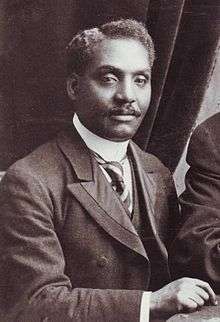John Alcindor
John Alcindor (8 or 9 July 1873 – 25 October 1924)[1] was a physician and activist from Trinidad who settled in London. He is known for his role in the African Progress Union, of which he became president in 1921.
John Alcindor | |
|---|---|
 | |
| Born | 8 or 9 July 1873 |
| Died | October 25, 1924 (aged 51) Paddington, London, England |
| Alma mater | Saint Mary's College; Edinburgh University |
| Known for | President of the African Progress Union |
Life
Alcindor was born in Port of Spain, Trinidad, where he was educated at Saint Mary's College; after winning one of the four Island Scholarships he went to study medicine at Edinburgh University, Scotland,[2][3] graduating from there with a medical degree in 1899.[4] He then worked in London hospitals, in Plaistow, Hampstead and Camberwell, going into practice on his own around 1907.[1] At this period he played cricket, as a wicket keeper for London teams.[5]
Refused a place in the Royal Army Medical Corps, Alcindor was awarded a Red Cross medal for his work with the wounded at London rail stations during World War I.[6]
Alcindor served as senior district medical officer of the London borough of Paddington from 1921 until his death.[7][8]
He is the great-uncle of Kareem Abdul-Jabbar (born Ferdinand Lewis Alcindor, Jr.).[9]
Activism
Alcindor associated in the late 1890s with the group around Henry Sylvester Williams and his African Association. They were behind the First Pan-African Conference in 1900, which he attended in London, as a delegate from the Afro-West Indian Society.[4][10][11]
Alcindor became the second president of the African Progress Union in 1921, succeeding John Archer.[1]
Alcindor presided on the first day of the 2nd Pan-African Congress in 1921, with Rev. W. H. Jernagin.[12] He spoke at the 3rd Pan-African Congress in 1923.[13][14]
Legacy
In July 2014 a blue heritage plaque in Alcindor's honour, organised by the Nubian Jak Community Trust, was unveiled at the site of Alcindor's surgery,[15][16] which is now the Medical Centre in Harrow Road, Paddington.[17][18]
References
- Jeffrey Green. "Alcindor, John (1873–1924)". Oxford Dictionary of National Biography (online ed.). Oxford University Press. doi:10.1093/ref:odnb/57173. (Subscription or UK public library membership required.)
- Robert A. Hill; Marcus Garvey (1995). The Marcus Garvey and Universal Negro Improvement Association Papers: Africa for the Africans 1921–1922. University of California Press. p. 168, note 2. ISBN 978-0-520-20211-5.
- "John Alcindor-Physician (1873-1924)", The Black Presence in Britain.
- Peter Fryer (1984). Staying Power: The History of Black People in Britain. University of Alberta. p. 299. ISBN 978-0-86104-749-9.
- Jeffrey P. Green (1998). Black Edwardians: Black People in Britain, 1901–1914. Psychology Press. pp. 181–. ISBN 978-0-7146-4871-2.
- Carole Elizabeth Boyce Davies, ed. (2008). Encyclopedia of the African Diaspora: Origins, Experiences, and Culture: Origins, Experiences, and Culture. ABC-CLIO. p. 928. ISBN 978-1-85109-705-0.
- Judith Ann-Marie Byfield; LaRay Denzer; Anthea Morrison (2010). Gendering the African Diaspora: Women, Culture, and Historical Change in the Caribbean and Nigerian Hinterland. Indiana University Press. p. 277, note 24. ISBN 978-0-253-35416-7.
- Green, Jeffrey (1987-07-01). "John Alcindor (1873–1924): A migrant's biography". Immigrants & Minorities. 6 (2): 174–189. doi:10.1080/02619288.1987.9974656. ISSN 0261-9288.
- Jamie Greene (27 December 2017), "The Great Big Beautiful Podcast, Episode 162: Kareem Abdul-Jabbar", Geek Dad.
- Jonathan Derrick (2008). Africa's "Agitators": Militant Anti-colonialism in Africa and the West, 1918–1939. Columbia University Press. p. 23. ISBN 978-0-231-70056-6.
- Felix Driver; David Gilbert (2003). Imperial Cities: Landscape, Display and Identity. Manchester University Press. p. 266, note 36. ISBN 978-0-7190-6497-5.
- Venetria K. Patton; Maureen Honey (2001). Double-Take: A Revisionist Harlem Renaissance Anthology. Rutgers University Press. p. 76. ISBN 978-0-8135-2930-1.
- Peter Fryer (1984). Staying Power. p. 323.
- The Crisis Publishing Company, Inc. (January 1924). The Third Pan-African Congress. The Crisis. p. 120. ISSN 0011-1422.
- Elizabeth Pears, "Recognition at last for the ‘black doctor of Paddington’", British Red Cross, 16 July 2014.
- "Patience Pays Off For ‘The Black Doctor Of Paddington’", The Voice, 28 July 2014.
- Goolistan Cooper, "Plaque honours Black Doctor of Paddington", GoWestLondon, 24 July 2014.
- "World War One ‘Black Doctor’ hailed as World War One hero with new heritage blue plaque", BEN TV, 10 July 2014.
Further reading
- Black History in Westminster (PDF), pp. 18–19.